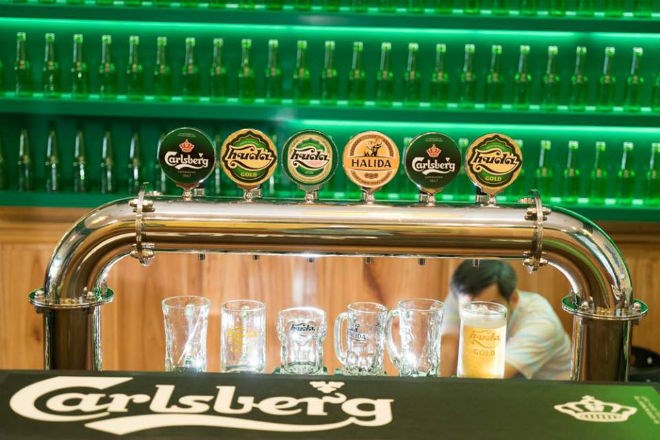Foreign brewers often set up joint ventures with Vietnamese partners and then take over the capital contribution from the Vietnamese partners. Why do they have to take this roundabout path to enter the market?

Experts believe that licenses are the main hurdle for new enterprises to join the beer market. In order to open breweries, enterprises must get licenses from the Ministry of Industry and Trade.
Though the regulations are clear, it is still difficult to obtain licenses because the licensing depends on the beverage industry development strategy.
In some cases, foreign companies can obtain licenses through negotiations between governments. However, in general, investors must follow complicated procedures to get licenses.
Masan Group, for example, in order to develop a brewery in Hau Giang province, has used a license granted earlier to another company.
Analysts believe that this is why both Heineken and Carlsberg lust for the stakes of Sabeco and Habeco, the two Vietnamese brewers.
| Foreign brewers often set up joint ventures with Vietnamese partners and then take over the capital contribution from the Vietnamese partners. |
Carlsberg is a success story about how a foreign company penetrated the Vietnamese market. The Danish brewer has acquired Hue Brewery which owns Huda and Huda Gold brands.
Analysts commented that Carlsberg took a wise move when it avoided the competitive southern market and decided to dominate the central region, which accounts for 6 percent of total beer consumption in Vietnam.
It also plans to penetrate the northern market, which consumes 35 percent of total consumption, by buying 17.3 percent of Habeco’s stake.
In 1994, Carlsberg set up a joint venture with Hue authorities with 50 percent of capital contribution. In 2011, it spent VND1.88 trillion to take over the 50 percent of capital from city authorities.
With the same method, Carlsberg acquired South East Asia Brewery. The brewery was established in 1994 and run by a joint venture between Carlsberg and Viet Ha Company. In 2014, Carlsberg completed the takeover after buying all the stakes held by Viet Ha.
Sapporo, another foreign brand, set foot in Vietnam in 2011, when it joined forces with Vintaba, a tobacco manufacturer, to set up a brewery. A short time later, Sapporo increased its ownership ratio in the brewery to 100 percent, while the Vietnamese amateur players left the playing field.
Heineken NV does not hold the largest market share, but it is now dominating the high-end market segment through two subsidiaries, Heineken Vietnam Brewery Ltd in charge of the central and southern market, and APB Hanoi in charge of the northern market.
Heineken NV now holds a 60 percent stake in Heineken Vietnam Brewery, while Satra, a state-owned trading enterprise, holds the remaining 40 percent.
Chi Mai / vietnamnet